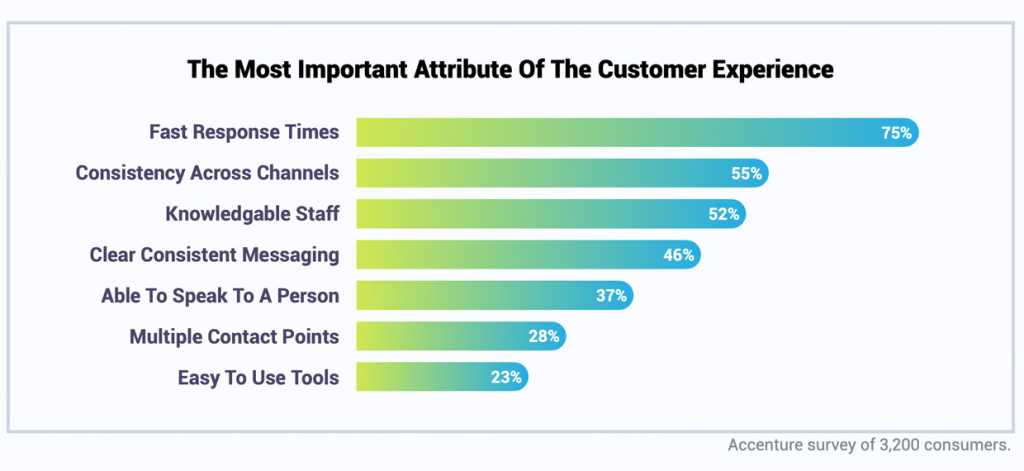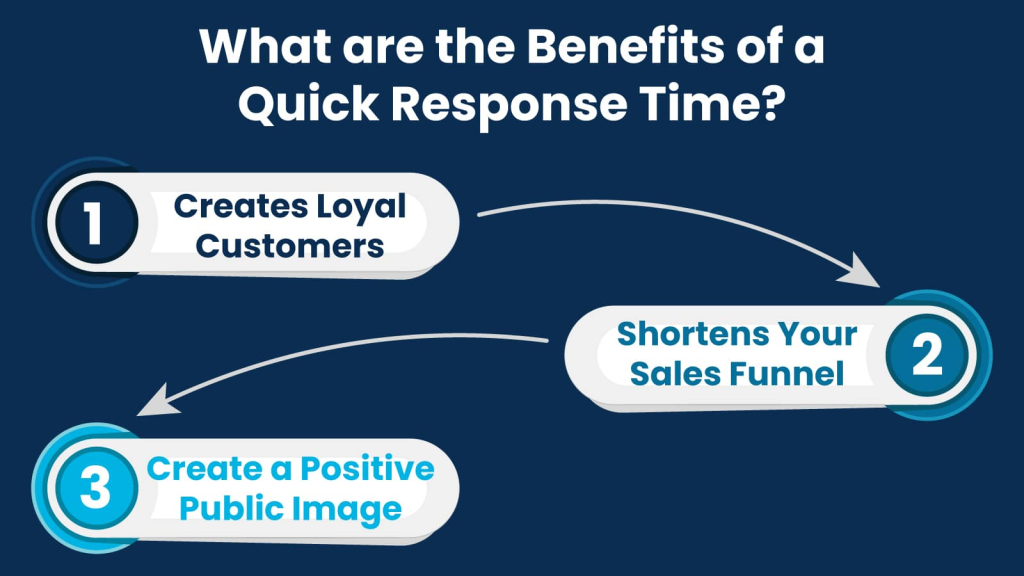In the highly competitive business landscape of today, customer service has become a crucial differentiator. One of the most significant aspects of providing excellent customer service is the speed at which a company responds to customer inquiries. Fast response times can have a profound impact on various aspects of a business. It ranges from building customer loyalty to enhancing its public image.

I. Creating Loyal Customers
- Demonstrating Care and Respect
- Immediate Acknowledgment: When a customer reaches out with a question or a concern, a prompt response shows that the company values their time and input. For example, if a customer sends an email about a product issue and receives an autoresponder within minutes. Followed by a detailed reply within an hour, they feel heard and respected. This initial positive experience lays the foundation for loyalty.
- Going the Extra Mile: In addition to quick initial responses, following up on the issue until it is fully resolved also matters. If a customer has a problem with a service and the company stays in touch, providing regular updates and solutions. Then, the customer is more likely to feel cared for. For instance, a telecom company that quickly addresses a customer’s network issue and then follows up to ensure the problem doesn’t recur builds a stronger bond with the customer.
- Meeting and Exceeding Expectations
- Surpassing Industry Standards: In many industries, customers have come to expect a certain response time. By beating those expectations, a company can stand out. For example, if a company typically responds to customer queries within minutes. The result is that customers are more likely to be impressed and remain loyal.
- Anticipating Future Needs: Fast response times also allow companies to anticipate and address potential future issues. If a customer asks about a product’s warranty and the company not only answers promptly but also provides information about upcoming maintenance services or upgrades. The customer sees the company as proactive and reliable, increasing loyalty.
II. Shortening the Sales Funnel
- Seizing the Buying Moment
- Capitalizing on Interest: When a customer shows interest in a product or service, a quick response can seal the deal. For example, if a potential customer sends a live chat message asking about the availability and price of a particular item. And the sales agent responds immediately with a personalized offer and additional product information. The customer is more likely to make a purchase then and there.
- Overcoming Objections Promptly: Customers often have concerns or objections during the sales process. A fast response to these objections can prevent them from losing interest. If a customer is hesitant about a software purchase due to concerns about its compatibility with their existing systems. And the sales team quickly provides a detailed compatibility analysis and offers a trial period. The customer is more likely to proceed with the purchase.
- Streamlining the Decision Process
- Providing Information Quickly: By responding rapidly with accurate and detailed information, a company helps the customer make an informed decision. For example, if a customer is comparing different vacation packages and asks about the inclusions and exclusions of each. A travel agency that responds promptly with a clear breakdown of the details can speed up the customer’s decision-making process.
- Facilitating Comparisons: Fast response times also enable customers to compare different options more efficiently. If a customer is considering multiple service providers and one is consistently faster in answering questions and providing quotes, that provider is more likely to be chosen as it makes the comparison process smoother and less time-consuming.

III. Creating a Positive Public Image
- Generating Word-of-Mouth Marketing
- Happy Customers as Brand Ambassadors: When customers have a great experience with fast response times, they are more likely to share it with others. For example, a satisfied customer who received quick and helpful responses from a local coffee shop’s customer service might recommend it to their friends and colleagues, leading to increased brand awareness and new customers.
- Online Reviews and Testimonials: Positive experiences also translate into favorable online reviews. If a customer had a quick resolution to a problem with an online retailer and was impressed by the response time, they are more likely to leave a glowing review on platforms like Google or Trustpilot, which can attract new customers and enhance the company’s reputation.
- Enhancing Brand Reputation
- Perceived Professionalism: A company that responds quickly to customer inquiries is seen as more professional and reliable. For example, a financial institution that promptly answers customer questions about account services or investment options gives the impression of being well-organized and trustworthy, which boosts its brand reputation.
- Differentiation from Competitors: In a crowded market, fast response times can set a company apart. If a company is known for its speedy customer service while its competitors are slow to respond, it can gain a significant competitive advantage and a more positive public image.

In conclusion, fast response times in customer service are not just a nice-to-have but a must-have in today’s business world. They have a far-reaching impact on creating loyal customers, shortening the sales funnel, and building a positive public image. Businesses that prioritize and invest in improving their response times are likely to reap the rewards of increased customer satisfaction, higher sales, and a stronger brand. By continuously monitoring and optimizing their response mechanisms, companies can stay ahead of the curve and ensure their long-term success in the highly competitive marketplace.




